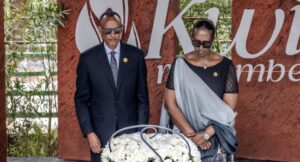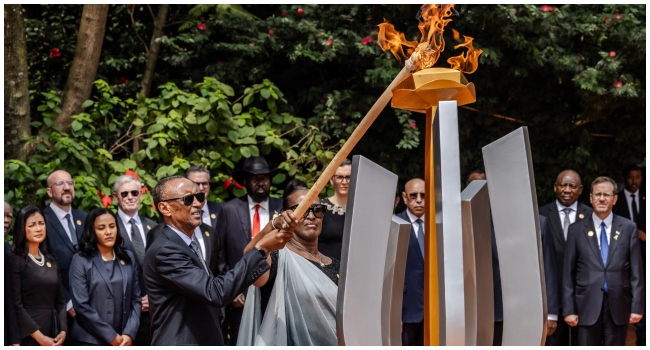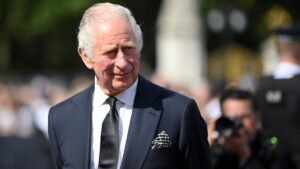Rwanda solemnly commemorated the 30th anniversary of the genocide on Sunday, honoring the victims of the brutal campaign that ravaged the country and left an indelible mark on its history.
The ceremonies, held across the nation, served as a somber reminder of the atrocities perpetrated during the 100-day killing spree before the Rwandan Patriotic Front (RPF) rebel militia took Kigali in July 1994, that claimed the lives of 800,000 people, primarily Tutsis but also moderate Hutus.
President Paul Kagame, who led the Rwandan Patriotic Front (RPF) rebel militia to end the genocide, presided over the remembrance events.
In a poignant gesture, Kagame lit a remembrance flame at the Kigali Genocide Memorial, where more than 250,000 victims are laid to rest.
Kagame will also give a speech at a 10,000-seat arena in the capital, where Rwandans will later hold a candlelight vigil for those killed in the slaughter.
The ceremony was attended by dignitaries, including foreign heads of state and former US president Bill Clinton, who acknowledged the failure of international intervention during the genocide.
The international community’s inaction has been a source of lasting regret, with French President Emmanuel Macron acknowledging France’s role in the genocide and expressing remorse for the lack of decisive action.
As part of the week-long national mourning, Rwanda will observe solemn tributes, with flags flown at half-mast and public activities restricted.
Music will not be allowed in public places or on the radio, while sports events and movies are banned from TV broadcasts unless connected to what has been dubbed “Kwibuka (Remembrance) 30”.
The United Nations and the African Union will also hold remembrance ceremonies.
Karel Kovanda, a former Czech diplomat who was the first UN ambassador to publicly call the events of 1994 a genocide, nearly a month after the killings began, said the massacres should never be forgotten.

“The page cannot be turned,” he told AFP in an interview in Kigali, urging efforts to ensure that “the genocide (doesn’t) slip into oblivion”.
The assassination of Hutu President Juvenal Habyarimana on the night of April 6, when his plane was shot down over Kigali, triggered the rampage by Hutu extremists and the “Interahamwe” militia.
Their victims were shot, beaten or hacked to death in killings fuelled by vicious anti-Tutsi propaganda broadcast on TV and radio. At least 250,000 women were raped, according to UN figures.
Each year new mass graves are uncovered around the country.
In 2002, Rwanda set up community tribunals where victims heard “confessions” from those who had persecuted them, although rights watchdogs said the system also resulted in miscarriages of justice.
Today, Rwandan ID cards do not mention whether a person is Hutu or Tutsi.
Secondary school students learn about the genocide as part of a tightly controlled curriculum.
The country is home to over 200 memorials to the genocide, four of which were added to UNESCO’s World Heritage list last year.
The memorials house skulls, bone fragments, torn clothing and images of piled-up corpses as well as the guns, machetes and other weapons used to carry out the slaughter.
These memorials serve as poignant reminders of the atrocities committed, housing artifacts and testimonies to ensure that the horrors of the past are never forgotten.
Despite the progress made in acknowledging the genocide and seeking justice, challenges remain, particularly regarding the extradition of genocide suspects and accountability for complicit parties. The anniversary serves as a solemn occasion to reflect on the past, honor the memories of the victims, and reaffirm the commitment to building a future rooted in peace and reconciliation.



























